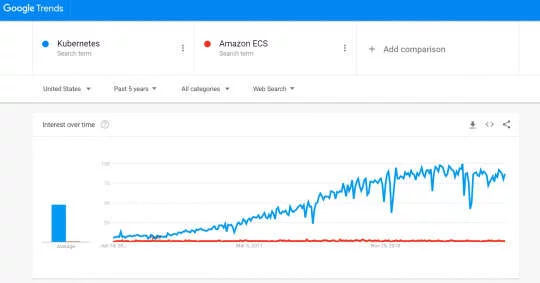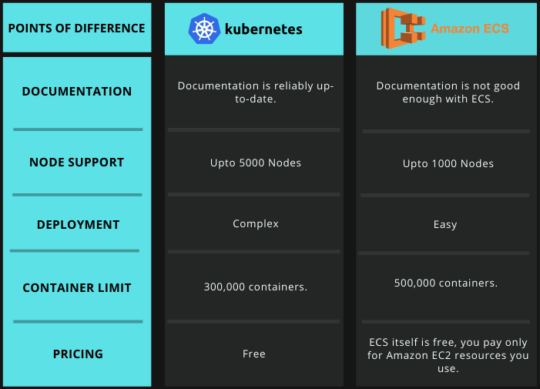Booming for several years, containers have changed the way we develop, deploy, and maintain software.
Containers are an operating system virtualization method that allows the launch of an application and its dependencies through a set of processes isolated from the rest of the system.
This method ensures the rapid and stable deployment of applications in any IT environment.
Container orchestration tools were created in order to automate the deployment, management, & scaling & availability of container-based applications.
In this article, we’ll compare two of the most prominent container management solutions i.e. Kubernetes and ECS.
Their comparison will help you better understand their respective advantages and probably make a choice between the two.
Kubernetes vs ECS: On the Basis of their Popularity, Benefits & More
Kubernetes is an open-source project created by Google in 2015 that orchestrates and automates the deployment, dimensioning and management of applications in containers.
Mainly Compatible with Docker, Kubernetes can work with any container system conforming to the Open Container Initiative standard in terms of image formats and execution environments.
Due to its open-source nature, Kubernetes can also be used freely by anyone, anywhere.
The main abstraction on which Kubernetes is based in the cluster, namely the group of machines running Kubernetes and the containers it manages.
Kubernetes consists of a series of components, each with a different purpose. To ensure that there is a separation of responsibilities and that the system is resilient, K8s uses a cluster of machines to run.
Key benefits of Kubernetes:
- Ability to keep track of container health.
- It helps to make your application run more stable.
- Support service discovery, scalability & load balancing.
- Isolation of containers.
- Automatic controllability and scalability.
- The Kubernetes API enables it to control basic scheduling units called pods.
Also Discover: Top 12 Container Orchestration Tools
Amazon ECS is a fully managed and scalable container platform. This service integrates with other AWS cloud services, such as CloudFormation for deployment management, as well as many other Open Source tools.
The scalability of ECS is its greatest strength. Even more importantly, connecting ECS to other AWS services is much easier.
It supports Docker containers and enables you to simply run applications on a managed cluster of Amazon EC2 instances.
The fundamental unit of Amazon ECS are tasks which are grouped into services by the task scheduler.
Key benefits of Amazon ECS:
- Amazon ECS APIs are extremely robust.
- Supports other docker image repository.
- Allows you to schedule long-running applications, batch processing & services via Docker containers.
- You can integrate with AWS services like Route 53 and IAM.
- Access to AWS features such as elastic load balancing.
- Flexibility to change underlying EC2 instances.
First of all, Amazon ECS is easier to use than Kubernetes. One of the faults, for which Kubernetes is often criticized is indeed its complexity.
For example, Kubernetes takes a long time to install and configure and requires some planning because the nodes must be defined before starting. The procedure also differs for each operating system.
With Amazon ECS, you just have to learn to master a set of tools to be able to create environments and configurations. On the other hand, Kubernetes demands an experience & a greater learning curve on the part of users of the tool.
Documentation is not good enough in Amazon ECS as compared to Kubernetes.
In addition, Kubernetes can be run on top of Docker but requires knowing the characteristics of their respective CLIs to be able to access the data via API.
It is necessary to know the CLI of Docker to navigate within the structure, and the CLI Kubectl of Kubernetes to execute the programs.
You may also like to read:
Understanding the Applications of Amazon ECS
Top 7 Kubernetes Use Cases and Examples
Jenkins vs. Docker: What’s the Difference?






